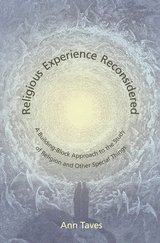 When I arrived at UC Santa Barbara for my graduate work in 2006, I had some horrible, vague idea about wanting to study issues of interreligious dialog(ue)—it was a mess. I’d just finished an undergraduate thesis about evolution debates and wasn’t sure where to go next. Fortunately, the professor I found myself paired with, Ann Taves, knew better. Already an accomplished historian, she had lately become taken by all the research going on in the brain and mind sciences about religious experience. Since my head had long been in the religion and science stuff, we had fantastic conversations and, before long, I cooked up a master’s thesis with her about the theoretical models at play in the latest scientific research on religion. And now, she’s got a whole book about it: Religious Experience Reconsidered: A Building-block Approach to the Study of Religion and Other Special Things.
When I arrived at UC Santa Barbara for my graduate work in 2006, I had some horrible, vague idea about wanting to study issues of interreligious dialog(ue)—it was a mess. I’d just finished an undergraduate thesis about evolution debates and wasn’t sure where to go next. Fortunately, the professor I found myself paired with, Ann Taves, knew better. Already an accomplished historian, she had lately become taken by all the research going on in the brain and mind sciences about religious experience. Since my head had long been in the religion and science stuff, we had fantastic conversations and, before long, I cooked up a master’s thesis with her about the theoretical models at play in the latest scientific research on religion. And now, she’s got a whole book about it: Religious Experience Reconsidered: A Building-block Approach to the Study of Religion and Other Special Things.
Today at The Immanent Frame, I have the pleasure of sharing a conversation I had with Ann about her new book, as well as her distinguished new role as president of the American Academy of Religion.
NS: Like your plans for the AAR, Religious Experience Reconsidered attempts to expose humanists and social scientists to new approaches in the study of religion. What obstacles need to be overcome?AT: There have been certain problems in the study of religion that we keep coming back to and gnawing on without being able to solve very well. One is the relationship between experience and what we call religion; another is whether, when you’re defining religion, it is a unique—or sui generis—thing apart from other things; and a third is the threat of reductionism. All of these have been inhibiting our ability to bring scientific approaches to bear on the study of religion. What I try to do in this book is to open up pathways that will make it easier to engage the scientific literature on the study of the mind without simplifying the conceptual framework in ways that would frustrate scholars of religion. What I’m working on is just one possible avenue for doing this, but however we do it, we have to responsibly connect the study of religion to other disciplines. Humans are biological beings; we’re cultural animals, as one psychologist puts it. We therefore have to take our biology into account, as well as culture, and the way the two have interacted over the course of human history.